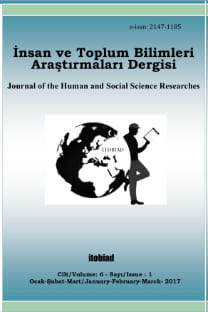Türkiye'deki Psikoloji Araştırmalarının Metodolojik Haritasının Çıkarılması
Mapping Out the Methodology of Psychology Research in Turkey
___
- Altheide, D. L. & Johnson, J. M. (1994). Criteria for assessing interpretive validity in qualitative research. In N. K. Denzin, & Y. S. Lincoln (Eds.), Handbook of qualitative qesearch (pp. 485-499). Thousand Oaks, CA: Sage Publications.
- Creswell, J. W. (2009). Research design: Qualitative, quantitative, and mixed methods approaches (3rd ed.). London: Sage publications.
- Creswell, J. W. (2013). Research design: Qualitative, quantitative, and mixed methods approaches (4th ed.). London: Sage publications.
- Denzin, N. K., & Lincoln, Y. S. (1994). Introduction: Entering the field of qualitative research. In N. K. Denzin & Y. S. Lincoln (Eds.), Handbook of qualitative research (pp. 1-17). Thousand Oaks, CA: Sage.
- Flick, U. (2009). An introduction to qualitative research. London: Sage publications.
- Guba, E. G., & Lincoln, Y. S. (1994). Competing paradigms in qualitative research. In N. K. Denzin & Y. S. Lincoln (Eds.), Handbook of Qualitative Research (pp. 105-117). Thousand Oaks, CA: Sage.
- Hammersley, M. (1995). The politics of social research. London: Sage.
- LeBreton, J. M., Barksdale, C. D., Robin, J., & James, L. R. (2007). Measurement issues associated with conditional reasoning tests: indirect measurement and test faking. Journal of Applied Psychology, 92.
- Lincoln, Y. S., & Guba, E. G. (1985). Naturalistic inquiry. London: Sage publications.
- Mertens, D. M. (2014). Research and evaluation in education and psychology: Integrating diversity with quantitative, qualitative, and mixed methods. London: Sage Publications.
- Michael, J. (1999). Measurement in psychology: a critical history of a methodological concept. Cambridge: Cambridge University Press.
- Michell, J. (2004). The place of qualitative research in psychology. Qualitative Research in Psychology, 1, 307-319. doi: 10.1191/1478088704qp020oa Michell, J. (2003). The Quantitative Imperative: Positivism, Naive Realism and the Place of Qualitative Methods in Psychology. Theory Psychology, 13, 7-31. doi: 10.1177/0959354303013001758
- Miles, M. B., & Huberman, A. M. (1994). Qualitative data analysis: An expanded sourcebook. London: Sage publications.
- Morgan, D. L. (2007). Paradigms lost and pragmatism regained methodological implications of combining qualitative and quantitative methods. Journal of Mixed Methods Research, 1, 48-76.
- Morse, J. M. (1991). Approaches to qualitative-quantitative methodological triangulation. Nursing research, 40, 120-123.
- Neuman, W. L. (2007). Basics of social research: Qualitative and quantitative approaches (2nd ed.). Boston: Pearson.
- Robson, C. (2002). Real world research (2nd ed.). Oxford: Blackwell Publishing. Rogers, A. G. (2000). When methods matter: Qualitative research issues in psychology. Harvard Educational Review, 70, 75-85.
- Smith, J. K. (1983). Quantitative versus qualitative research: An attempt to clarify the issue. Educational Researcher, 12, 6-13.
- Tashakkori, A., & Teddlie, C. (1998). Mixed methodology: Combining qualitative and quantitative approaches. Thousand Oaks, CA: Sage.
- Teddlie, C., & Tashakkori, A. (2009). Foundations of mixed methods research: Integrating quantitative and qualitative approaches in the social and behavioral sciences. Thousand Oaks, California: Sage Publications Inc.
- ISSN: 2147-1185
- Yayın Aralığı: 4
- Başlangıç: 2012
- Yayıncı: Mustafa SÜLEYMAN ÖZCAN
Kur’an’da Bazı Kelimelerin Kullanım Özelliklerine Dair Genel Kaideler
Sosyal Medyada Kulaktan Kulağa İletişime Yönelik İhtiyacın Marka Bağlılığına Etkisi
Klasik Türk Edebiyatına Yansıyan Yönleriyle "Galata"
7. Yüzyılda Harem-i Şerif’te Bir Sinagog: Tarihi Bir Gerçeklik mi Hayal mi?
Hayrettin Ziya Taluy’un “Küçük Bir Gezginin Serüvenleri” Serisinde Anadolu’nun Temsili
Osmanlı Gayrimüslim Okullarında Türkçenin Yaygınlaştırıl-masına Yönelik Faaliyetler (1876-1908)
